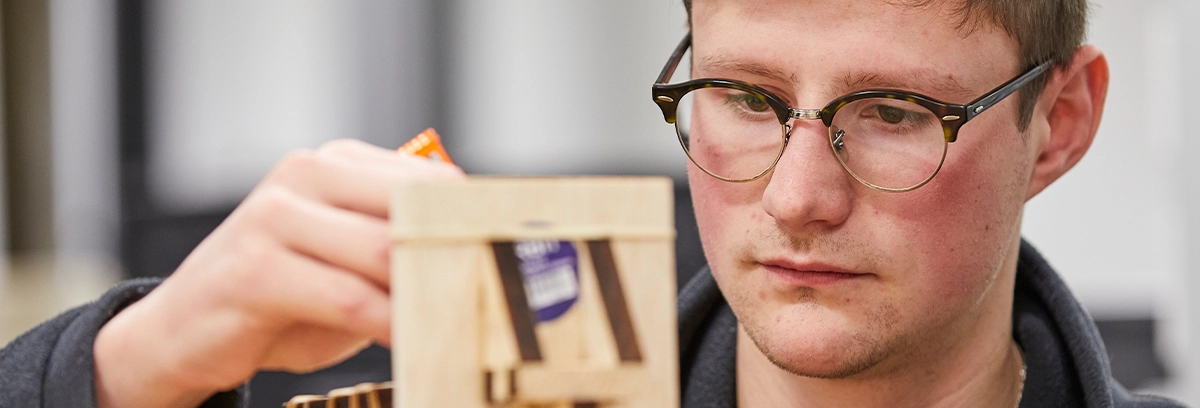MEngRenewable Energy Engineering
Contact admissions
- 4 years
- 5 years with foundation year
- 8 years part-time
- 9 years part-time with foundation year
Why study a renewable energy engineering degree at Solent University
Develop advanced expertise in sustainable energy technologies, automation, and smart grids, preparing you for a cutting-edge career solving global energy challenges.
- 0thuniversity in the UK for low carbon emissions (THE 2023)
- Top0%for teaching quality, out of 131 institutions (Times Good University Guide, 2025)
- 0thUK uni for sustained employment (Longitudinal Educational Outcomes, 2022)
- The Science and Engineering Foundation Year is the ideal way to prepare for degree study, with successful completion granting direct access to undergraduate engineering.
- This integrated masters degree combines both undergraduate and postgraduate-level study within one course, enabling you to build an advanced understanding of renewable energy engineering.
- Access to a range of high-end facilities including 3D printers and laser-cutters, PSpice/NI MultiSim software and microcomputer development systems, digital multi-meter signal generators, FLIR cameras and digital signal processing boards.
- Strong focus on hands-on exploration. This degree incorporates practical challenges, workshops and exercises, so you can put theory into practice straight away.
- Solent is a pioneer in environment and engineering research – you will learn direct from leading experts in their field.
- Solent University is part of a research and innovation collaboration that has been awarded almost €16 million to look at the options for green technology in the maritime industry.
- This course is also available to study part-time.
- You’ll be assigned a personal tutor who can assist you with pastoral support to help you make the most of your learning.
- Every student at Solent University will also have the option to study an additional Certificate in Practical Artificial Intelligence qualification alongside their course. Free of charge, the course ensures you'll be prepared for a fantastic and varied career after graduation.
Course overview
This integrated master’s programme with foundation year equips you with skills in renewable energy technologies, smart grids, sustainable engineering, renewable power systems and energy management – preparing you for a career solving global challenges through innovation.
You’ll be taught by an experienced academic team, starting your studies with a Science and Engineering Foundation Year, building up your base knowledge and preparing you for degree level study. In your second year, you will progress onto modules including professional engineering skills, solar and wave energy systems and eco-vehicle technology, while developing transferable skills in project management, advanced analytical skills and computer-aided design and simulation.
In addition, specific aims of this course are to provide the opportunity for each student to demonstrate their ability to develop appropriate solutions for existing and emerging problems in the renewable energy sector, using new and existing technology, through innovation, creativity and change. The course is also consistent with the content and standards expected of relevant accrediting professional institutions, the Engineering Council and the QAA.
Throughout the course you will be provided with a range of opportunities for hands-on experience in our industry-standard Institute of Technology (IoT) engineering labs, whilst being given a range of real-world work-based learning projects to increase your employability skills and potential. Upon graduation, you will leave Solent with an integrated Master's (MEng) qualification, providing a competitive edge in the job market and a solid foundation for further research.
Any questions?
Contact international admissions
Email: Call:Part of:

Course features
Foundation year available
If you're not quite ready for a full undergraduate degree, there's alternative entry through one of our foundation years
Specialist facilities
This course has access to CISCO networking labs and computing and usability labs.
Part-time option
You can study this course part-time
Who is this course for?
This MEng in Renewable Energy Engineering is ideally suited for students passionate about sustainable technology and eager to tackle global energy challenges.
What does this course lead to?
Graduates of this course will be well-prepared for a wide range of professional roles in the renewable energy sector and related fields.
Meet the team

Dr Nils Bausch
Course Leader

Dr Abdulla Tahhan
Lecturer

Dr Fayyaz Rehman
Associate Professor

Dr Graeme Smith
Senior Lecturer

Dr Laurie Wright
Associate Professor of Marine Sustainability

Trevor Bullman
Technician Instructor

Dr Puja Mishra
Lecturer

Dr Sinan Khwandah
Lecturer

Dr Tony Morris
Senior Lecturer

Dr Whysnianti Basuki
Associate Professor

David Hawkins
Associate Lecturer

Brenda Short
Associate Lecturer

Dr Shehu Yusha’u
Lecturer
The University cannot guarantee any particular members of staff will teach specific aspects of the course in the future, but will endeavour to ensure the teaching team maintains their balance of experience and qualifications.
Facilities
To aid study, students have access to our specialist facilities, including a 60m towing tank for wave generation and tidal turbine use; composite materials laboratory for construction of lightweight structures; and our materials testing laboratory.
Our vibrant campus brings state-of-the-art facilities to enhance your learning and elevate your student experience. Our award-winning teaching building, The Spark is centred around students and offers a stimulating study environment with flexible learning spaces. Away from studying, why not try out the gyms, fitness studios and sports halls in our £28 million Sports Complex, or watch a blockbuster film at our student-run cinema with Dolby Atmos audio.
International opportunities
Broaden your horizons by adding an international dimension to your CV – essential to achieving success in today’s fast-changing, global environment.
Studying, working or volunteering in another country could be the experience of a lifetime. Enhance your degree by developing important global skills such as knowledge of other countries, language skills, intercultural awareness, adaptability and confidence.
For more information, please email international.mobility@solent.ac.uk.

What you'll study
Core modules
Science and Engineering Foundation Skills
In this module you will develop a range of key skills and knowledge designed to help you develop the underpinning knowledge and skills for the remaining modules of the course. This can be broadly categorised into: communication skills; collaborative skills; numeracy skills; information and communication technology skills and problem solving skills.
Fundamental Mathematics for Science and Engineering
You will build on the Science and Engineering Foundation Skills module, exploring fundamental approaches to mathematics, such as numbering systems and Boolean logic.
STEM Concepts and Processes (Applied)
You will plan and undertake experiments, or validate numerical models, related to science and engineering related topics from a range of general areas related to the parent degrees supported by the course (these are outlined in more detail in the STEM Concepts and Processes (Theory) module).
STEM Concepts and Processes (Theory)
You will study theoretical science and engineering related topics from a range of general areas related to the parent degrees supported by the course.
Personal Development Planning
This module is designed to help you to develop a range of transferable academic and career planning skills.
Degree-Related Project
The learning on this module is primarily derived from an experiential approach, enabling you to apply the skills and knowledge from the other modules to the analysis of a real problem related to your interests.
How you will learn and be assessed
You will learn by:
You may be assessed by a combination of:
- Reports
- Portfolios
- Group presentations
- Individual presentations
- Written exams
- Research projects
Solent’s curriculum framework builds on our unique, creative and applied approach to teaching. The transformation of students’ lives is at the heart of our mission as a university, and our curriculum – informed by the latest theory – reflects this shared educational vision.
Find out more
Study support
The student achievement team are on hand to help you succeed during your studies at Solent. They aim to contact you at key times during your time here with personalised information, advice and guidance, by email or phone.
The disability advice team provides information, advice and guidance for disabled students.
All students can access Succeed@Solent, Solent's online guide to getting better grades. It offers extensive, practical information and advice on topics such as academic writing, research and presentations.
Why choose the industry?
The renewable energy and sustainable engineering industries are growing, thanks to international requirements to combat climate change and greenhouse gases. Drivers such as the financial and environmental cost of energy are also resulting in a new emphasis in the efficient use of energy, from state-of-the-art racing cars, to road cars, to plant and machinery. Developments in renewable energy in wind, wave and tidal energy alone are expected to create tens of thousands of new jobs in the next decades.
The UK is geographically placed to gain particular benefit from renewable energy, and as such the industry has developed in the UK. Currently in the UK there are almost 11,500 wind turbines - 8,827 operational onshore turbines, and a further 2,652 offshore turbines demonstrating the scale of this growing industry.

You could earn:
Energy Engineer
Starting salary: £25,000 to £35,000
With experience, you could earn a salary in the range of £35,000 to £60,000.
Environmental engineer
Starting salary: £20,000 to £28,000
With experience this can increase to between £30,000 and £45,000.
The stated salaries are published on prospects.ac.uk. Income figures are intended as a guide only.
Solent Careers
The Solent Careers team is committed to getting students into great careers.
While you are studying, the team can help you with finding work experience or placements, link you with a mentor, check your CV, or offer one-to-one guidance.
If you're in your final year, we also have graduate job opportunities just for Solent graduates.

6th
UK uni for sustained employment
Longitudinal Educational Outcomes, 2022
Accredited by
Part of:

Tuition fees
The tuition fees for the 2025/26 academic year are:
- UK, ROI, EU (settled status) and Channel Island full-time fees for foundation year: £9,535 per year
- UK, ROI, EU (settled status) and Channel Island full-time fees: £9,535 per year
- International full-time fees: £15,050 for foundation level. Fees will increase from year 1 onwards.
- International full-time fees: £17,750 per year
For further information, please visit our tuition fees page.
Extra course costs
While most course costs are covered by your tuition fees, some essential resources and optional extras may need to be paid for separately. These additional costs are listed below. For advice on budgeting and managing your money, please contact student.funding@solent.ac.uk.
The 2025/26 other costs are not yet available. For guidance, the 2024/25 other costs were:
Optional costs
- Stationery and local travel to industry for interest visits: £200
- Minor materials cost for final major project: approximately £50
Bursaries, scholarships and financial support
Solent University offers a range of bursaries and scholarships that provide financial assistance or waive fees for tuition or accommodation. Each bursary or scholarship has specific eligibility criteria. Check out our bursaries and scholarships pages to find out more.
Cost of living support
At Solent, we understand that the cost of living crisis may be of some concern. To help, we've put together some detailed information to show what support is available and how to make your money go further.
Graduation costs
There is no charge to attend graduation, but you will be required to pay for the rental of your academic gown (approximately £45 per graduate, depending on your award). You may also wish to purchase official photography packages, which range in price from £15 to £200+. Graduation is not compulsory, so if you prefer to have your award sent to you, there is no cost. Extra guest tickets will go on sale after results publication and will be sold on a first-come-first-served basis. The cost per ticket is currently £15. Please note, we do not guarantee there will be any extra tickets available to purchase.
Student finance videos
Student funding - the essentials
Entry requirements
Please select an option below:
Key entry requirements
48 UCAS tariff points
- A minimum of two completed A-levels, a BTEC Extended Diploma at PPP or BTEC Diploma at MP, a T-Level Pass (D or E), or equivalent.
- We will consider mature students who have not recently undertaken a formal course of study at A-level, or equivalent, but can demonstrate relevant work or voluntary experience, that's indicative of their ability to complete the course successfully.
Key entry requirements
As a general guide, we look for qualifications that are equivalent to the British high school A-levels.
If you are applying from outside the UK, find information about entry requirements, visas and agents for your country here.
For further information about EU qualifications, please see our course entry requirements document.
For international students who do not meet the direct entry requirements for this undergraduate degree, our trusted partner, QA Higher Education offers the following pathway programme designed to develop your academic and English language skills:
- International Foundation Year - for progression to the first year of an undergraduate degree
Key entry requirements
As a general guide, we look for qualifications that are equivalent to the British high school A-levels.
If you are applying from outside the UK, find information about entry requirements, visas and agents for your country here.
For further information about international qualifications, please see our course entry requirements document.
For international students who do not meet the direct entry requirements for this undergraduate degree, our trusted partner, QA Higher Education offers the following pathway programme designed to develop your academic and English language skills:
- International Foundation Year - for progression to the first year of an undergraduate degree
Note to all international students requiring a visa
All international applicants need to be aware that the English language requirements to attend Solent University, and the English language requirements to obtain a visa from the Home Office, may be different. This means that if you meet the Solent University language requirement to gain a place on the course, you may still have to meet additional requirements to be granted with a visa by the Home Office.
We strongly advise all applicants to visit the Home Office website which outlines all the requirements for a successful visa application
Any questions?
Contact international admissions
Email: Call:How to apply
Full-time
Any student applying for the first year of a full-time/sandwich undergraduate course must apply through UCAS (University and Colleges Admissions Service). This includes mature, overseas and EU students.
Nearly all schools and colleges offer their students the facility of applying electronically through the UCAS website using 'Apply'; it may also be used by those applying independently in the UK and overseas. This facility and all course information can be found on the UCAS website: www.ucas.com.
Your application should reach UCAS by 31 January if you hope to enter a course the following autumn. Early application is advised for the most popular subject areas. Late applications may be made until the end of June. The UCAS Code for the University is S30, code name SOLNT.
Find out what happens after you apply
Contextual offers
Solent endeavours to offer learning opportunities to students from all backgrounds. When we receive and review an application, we take into consideration the context and personal circumstances of applicants when making a decision, which means our advertised entry tariff could be reduced.
Language requirements
Applicants who do not have English as their first language will be required to demonstrate an approved level of proficiency in the use of the English language. The agreed minimum requirements for this course are:
- IELTS minimum 6.0 overall with a minimum of 5.5 in each individual component
- TOEFL IBT minimum 80 with a minimum of 20 in each individual component
- Duolingo English Language Test - 115 overall with minimum of 95 in each component or equivalent.
Qualifications are checked before enrolment, and international students must bring their original certificates or certified copies when coming to study at the University.
Pre-Sessional English programme
The University also offers a pre-sessional English programme for international students who wish to improve their level of English before starting a degree course.


Make your application
- 4 years
- 5 years with foundation year
- 8 years part-time
- 9 years part-time with foundation year






